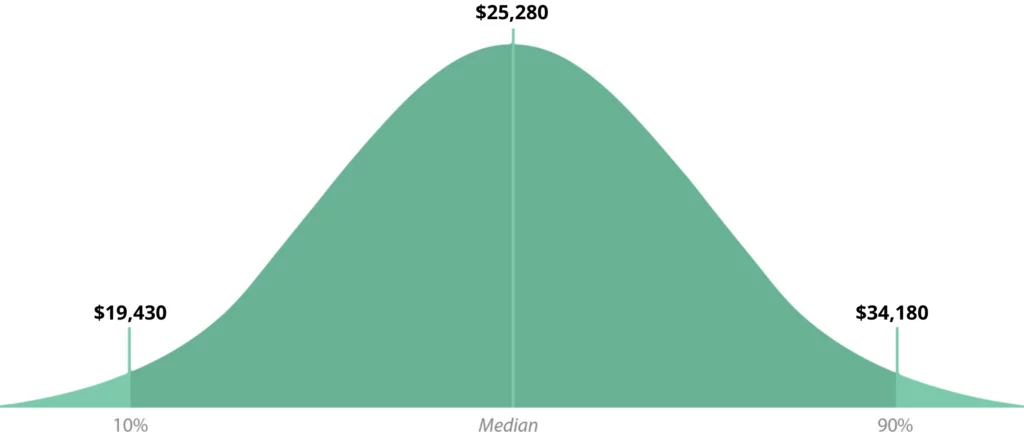
1. Overview: Job Responsibilities, Salary, and Common Requirements
2. A Comprehensive Guide to Becoming a Home Health Aide
3. What Does a Home Health Aide Do?
4. Signs You Should Consider Becoming a Home Health Aide
5. How Do You Become a Home Health Aide?
6. What are the Knowledge and Skills Needed to be a Home Health Aide?
7. Popular Schools and Colleges in the U.S. for Aspiring Home Health Aides
8. How to Get a Job as a Home Health Aide
9. Learn About Geographic and Location Pay Differentials
10. Make Your Resume Stand Out
Home health aides made a median salary of $25,280 in 2019, according to the Bureau of Labor Statistics. The best-paid 10 percent made $34,180 that year, while the lowest-paid 10 percent made $19,430.

Childcare Workers
Home Health Nurse
Licensed Practical and Licensed Vocational Nurses
Nursing Assistants and Orderlies
Occupational Therapy Assistants and Aides
Physical Therapist Assistant and Aides
Psychiatric Technicians and Aides
Registered Nurses
Social and Human Service Assistants
Basic safety measure techniques
Basic Nutrition
Nursing and healthcare administration
Physical stamina
Attention to detail
Communication skills
Compassion
Patience
More older adults in utter need of care choose to stay at home rather than at nursing homes and facilities. This increasing demand for home care opens up opportunities for home health aides.
Home health aides provide the assistance a patient needs in terms of medical and non-medical. A lot of patients rely on these professionals to perform daily tasks and household chores. The demand for such professionals is growing as more people realize how much they can save up on costs when they hire one instead of staying at a nursing facility.
Home health aides provide help to clients with illnesses, disabilities, or cognitive dysfunction by aiding them in their daily tasks. Mostly working under the direction of a nurse or a healthcare practitioner, home health aides attend to the medical needs of a patient at home. In addition to medical assistance, they also do various non-medical tasks that include personal care and housekeeping.
Here are the responsibilities of a home health aide:
You may have your eye to become a home health aide; however, if you do not have the qualities that make a good home health aide, you might find yourself struggling. Prior to pursuing a career, you must always evaluate how you fit in a role. Here are the telltale signs that you are wired to become a home health aide:
Do you consider yourself good at communicating with various kinds of people? This job requires you to be comfortable at constant interactions as you are always around your patients, their families, nurses, and other health care staff. A bulk of your job is being the middleman of the patients to their doctors—when reporting the progress in their condition. Plus, the fact that you are always with your patient requires you to be good at talking to them.
To work as a home health aide, you have to instill integrity and professionalism so that your clients and patients will trust you. You should be able to obey the set of job limitations and care approach given by your patient’s family and the doctors or nurses.
Patience is essential for any health-related profession, especially for home health aides. On a daily basis, you are dealing with difficult situations that require long patience, especially for patients with cognitive issues like dementia or Alzheimer’s. If you think you can keep calm under various situations, you can expect that your career will sail smoothly.
Patience goes together with empathy to provide patients great care. If you have always felt empathy for people, it’s easy for you to understand what they are going through. When you can feel for others, you are more aware of what needs to be done—thus, you are providing better care than anyone who doesn’t really care.
Good stamina is needed to survive in this physically demanding role. You will be tending to someone who relies on great assistance from you. You must be able to provide that with your own physical capacity. You will be running around, driving, assisting with meditation/exercises, doing light housekeeping, and many other tasks that require physical endurance. If your physical health is in good condition, you can definitely perform your responsibilities without any problem.
Are you a person who has great attention to detail? If you are, you can easily ace your tasks as a home health aide as the job requires such a trait. You are to ensure patients are taking the right medications, keep track of their progress, maintain records, and monitor their condition. All these responsibilities require your accuracy, so you need to have that in you.
The core of your job is helping those who are in dire need of assistance in performing daily tasks. Someone who has a genuine heart to help is the perfect person to fulfill the responsibilities of a home health aide.
As a home health aide, you are not only assisting with medical care tasks, but you are also needed to aid with non-medical duties such as housekeeping and other errands. If you are a person who can easily juggle various kinds of tasks, you will have no problem with the demands of this role.
Oftentimes, you will be asked to stay for long hours to attend to your patient—most especially for those who work in a home setting. It might seem pretty exhausting to work for long hours, but if you are willing to do so, you are one step ahead, among others who refuse to.

To become a home health aide, you have to meet its requirements that demand you to undergo the following steps:
A high school diploma is the basic credential to enter the field. However, it is not a strict requirement for some employers. But having at least a high school diploma will amp up your chances of finding a career opportunity. Plus, the pursuit of a postsecondary non-degree program that relates to providing health care will amplify your credentials as an aspiring home health aide, as well. This kind of programs are usually offered at community colleges near you or at the National Association for Home Care and Hospice (NAHC).
To prove your knowledge in providing first-aid and CPR, you will have to earn your certifications. You can typically get these from taking up online classes like this Introduction to First-aid and CPR masterclasses. It is a strict requirement for any aspiring home health aide to have a foundation of how health emergency safety measures are performed as you will be working closely with the patient at home.
Some states require home health aides to undergo specific training and pass a standardized test prior to working as a home health aide. You need to be trained in housekeeping tasks, dietary and nutritional requirements, as well as basic safety techniques. These training may be completed on community colleges, vocational institutions, or some healthcare agencies offering such formal training.
The completion of a formal training and standardized exam vary upon the state you reside in. Check your state’s health board to find out the other requirements needed to be a home health aide in your area.
A driver’s license is essential to become a home health aide as you will accompany your patients to or from the doctor’s appointments and run errands for them. Some employers will strictly require you to have a valid in-state license with no more than two points in the last three years.
In addition to the requirements to be a qualified home health aide, you need the right qualities that make one successful in this career. Here are some of those skills and knowledge you have to instill to thrive in the field:
Understanding of the basic safety measure techniques
As a health care provider at the comfort of your patient’s home, you are expected to deliver some basic safety techniques in times of need. In addition, you will also need to know how to check vital signs and use some medical equipment that is used for your patient. You will learn all of these during your training and upon receiving your certifications for CPR, first-aid, and other healthcare-related administration training.
Awareness with basic nutrition
Patients are prescribed with their respective dietary plans, which you need to follow. This will be covered in your formal training, or you can take up an online class about basic nutrition. It’s important to understand how nutritional value impacts the health of your patients, so you will know the proper meals to prepare for them.
Nursing and health care administration
As the person in charge of administering health care without the constant supervision of a nurse or a certified health practitioner, you must learn to do medical tasks on your own. This will include proper care of wounds, assisting in mobilization, checking of vital signs, and ensuring the right time for medications.
Physical stamina
Having the physical capacity to perform physically enduring tasks is important in fulfilling all your duties. Without good health, your patient can’t fully rely on you as you have to assist them with their daily activities they can’t do on their own.
Attention to detail
Being detail-oriented is a crucial trait that is needed in properly carrying out the tasks of a home health aide. You will have to follow specified directions from nurses or case managers to ensure the safety of the patient. You are putting your patient’s health at risk when you are not careful with every task you are doing.
Communication skills
Good communication skills come in handy when you are reporting to a nurse or doctor about the progress of the patient’s condition. You are also bound to make frequent communication as you are always by your patient’s side—you are to serve as his confidant when he/she is lonely. You are not only serving as an assistant to your patients, but you are also their companion who can handle long conversations with them.
Compassion
Genuine love for helping others will easily shine through on your job. If you are not passionate at all with the value of helping others, people will easily see through it. You must be able to feel for your patients to be able to provide the right care they need.
There are several community colleges and vocational schools that offer degree/non-degree programs specializing in Home Health Care. Here are those popular colleges across the country that offer such programs as listed by Universities.com.

When looking for a job as a home health aide, you have a lot of options to explore. Here are some helpful tips on how you can land a job as a health home aide.
A sure way to find a job is checking your nearest health care facilities that take shelter of the elderly. Make some research as to how many facilities you can personally pay a visit to check job availability, or you can look them up online to send an online application. With several health care facilities located in every community, you are bound to find a career opportunity for you.
Word of mouth is a powerful way to source career opportunities. Ask your friends, family, professional connections, previous coworkers, and more if they know any referral for you. The largest employer of home health aides come from residential homes—if your connections know anyone who is in dire need of a health home aide, they can just refer you. You can make use of your LinkedIn in building an online resume and finding career opportunities from various health care facilities.
The most convenient option to look for a job is through the use of online job portals. Technological advancements have paved the way for a speedy job application, so make use of it when you want to save time in finding job opportunities.
In addition to LinkedIn, here are some of the suggested job search engines you should look up in your exploration:
Earning an average of $25,280 in 2019, Home Health Aides still have to consider the state they are going to work in. The pay for every location differs for every state. For reference, here is a table containing the pay differentials of home health aides across all states as reported by the Bureau of Labor Statistics.
| State | 2019 Mean Annual Wage |
|---|---|
| Alaska | $34,740 |
| North Dakota | $33,330 |
| Vermont | $32,590 |
| Massachusetts | $31,500 |
| Washington | $31,000 |
| Rhode Island | $29,490 |
| New York | $29,290 |
| California | $28,780 |
| Oregon | $28,740 |
| Minnesota | $28,320 |
| Hawaii | $28,290 |
| Connecticut | $28,280 |
| Wyoming | $28,220 |
| Colorado | $28,020 |
| New Hampshire | $27,500 |
| Utah | $27,430 |
| Maryland | $27,420 |
| Maine | $27,400 |
| Iowa | $27,380 |
| New Jersey | $27,200 |
| South Dakota | $28,840 |
| Nebraska | $26,730 |
| Gergia | $26,500 |
| Illinois | $26,450 |
| Kentucky | $26,410 |
| State | 2019 Mean Annual Wage |
|---|---|
| Arizona | $26,050 |
| Montana | $25,890 |
| Pennsylvania | $25,810 |
| Michigan | $25,660 |
| Wisconsin | $25,090 |
| Nevada | $25,050 |
| Missouri | $24,670 |
| Florida | $24,630 |
| Delaware | $24,530 |
| Idaho | $24,380 |
| Indiana | $24,100 |
| Ohio | $23,810 |
| Kansas | $22,950 |
| New Mexico | $22,720 |
| Virginia | $22,610 |
| Arkansas | $22,520 |
| South Carolina | $22,470 |
| Tennesee | $22,140 |
| Oklahoma | $22,020 |
| North Carolina | $21,990 |
| West Virginia | $21,590 |
| Texas | $20,950 |
| Mississippi | $20,860 |
| Alabama | $19,960 |
| Louisiana | $19,680 |
Report from the Bureau of Labor Statistics
Creating an impressive resume doesn’t have to demand much of your effort. You just have to ensure that you put in the right information to strike a good impression to prospective employers when they see it. A well-polished resume amps up your chance of landing an interview so make sure you create one that easily leaves a remarkable but positive impression.
Here are some helpful pointers on how you can construct an impressive resume:
Begin your resume by providing a brief summary of who you are, what your experiences are, and what your career objective is. Condense it in a digestible short paragraph containing three sentences tops. Make it convincing enough to lure your prospective employer into continuing to read your credentials. Do not share too much yet—save that for the interview! Just a glimpse of your valuable assets are enough to intrigue them.
When you are constructing, you should steer clear of writing long statements that can draw any readers away. Make use of bullet forms to organize the contents of your resume. Use it in enumerating your skills and some experiences you’ve had. This way, you are presenting a neat and organized set of skills that do not strain the eye of your prospective employer.
When you apply for a job opening, it’s advised to align your resume to the given job description. Here’s how a home health aide job description typically looks like:
We are looking for a resourceful home health aide to join our growing team. Your primary role will be helping patients with assistance for personal hygiene, medical, housekeeping, and other daily activities. To be the right candidate, you need to have a genuine interest in health care and the ability to work with limited supervision as you prioritize your patient’s needs.
Ensure that you shed light on the aspects that your prospective employer is looking for. You can use keywords in doing this. Keywords are used to stand out among a pile of other applicants who have submitted regular resumes. You can add these words to amplify your qualifications:
In the context of home healthcare, the adoption of FHIR solutions can play a crucial role in improving the efficiency and coordination of patient care.
A resume that consists of any grammatical errors, inconsistencies, unnecessary spaces, and other mistakes instantly turns off anyone who reads it. Ensure yours is error-free by proofreading and ensuring consistency of tone. You can even read it out loud to help you find corrections and put yourself in the employer’s perspective when they read your resume.
One mistake most applicants do when in the midst of finding jobs is creating one resume for several employers. As an applicant, you have to be responsible enough to find out what specific requirements an employer is looking for. Use the job posting to curate a resume that will align with the needs of the position. Practice crafting one resume for each employer you are interested in to increase your chance of standing out among all other applicants.
When you have successfully secured an interview, all that’s left is acing that interview to finally land your dream job! Review some common interview questions so that you are prepared to answer them when the big day comes. To help you get ready on your interview, here some interview questions and answers that you can use as your guide:
The question demands the knowledge of the job responsibilities of a health home aide. Prepare an answer that will enumerate your previous experiences that are highly valuable in this job you are applying for. Provide support that demonstrates your adeptness in every skill you mention.
There will be instances that a patient refuses to get helped. Some will be grumpy—testing your patience. The interviewer seeks to know your temperament.
To answer this question, explain how you are going to handle the situation with calmness. You should be able to prove that you don’t get easily budged by difficult situations. Your genuine care should shine through above the situation as you understand what your patients are going through.
A question to test your organization and communication skills, this seeks to know how trustworthy you can be in monitoring the condition of your patient. As you are responsible for keeping track of the symptoms or any progress in your patient, you ought to report that to others, like family members, other caregivers, and nurse/doctor.
Show in your answer your willingness to communicate freely with people involved in your service. Highlight the needed social skills that make you comfortable at interacting with people, which makes it easier for you to keep them up-to-date with the patient’s condition.
As the one in charge of monitoring the patient’s health conditions at home, you must be able to know the differences he/she makes every single day. Attention to detail is key to being organized in this duty. This question demands to prove to your employer your understanding of following policy that includes being prompt at reporting instances like them.
You should be able to stay on top of the situation by being calm and focused on reaching out to those who need to know about it.
One of the demanding tasks of being a home health aide is having no definite time for offs or rest. Most of the time, you will stay in to tend for your patient—making it excruciatingly exhausting.
If you are fine with that setup, you can manage to answer this. Just be able to provide the support that lack of sleep and continuous routine do not have any negative impact on the quality of your service. Whereas if this setup matters to you, you can try to negotiate for a definite number of time-offs.
Sharpen your skills in home health care by taking these top online courses
Kick-start your journey to become a home health aide with these informational pieces of training from Skill Success:









